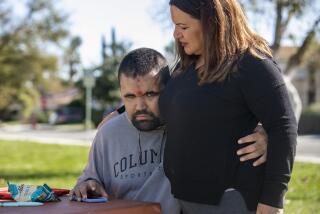Deafness Is Key to Defense in Murder Trial
- Share via
The courtroom for the Ronald James Blaney Jr. murder trial in Santa Ana will be filled with sign language when testimony begins this week.
One interpreter will help Blaney, deaf since birth, understand what is said in court. One is a backup. A third will help Blaney and his lawyer talk to each other. The spectators, most of them deaf or partially deaf, will communicate by sign too.
But it is not the need for signers that makes deafness a predominant factor at Blaney’s trial. Deafness also is a key ingredient in his defense.
Blaney faces a possible sentence of life without parole if convicted of murder in the May 4, 1987, stabbing deaths of his former girlfriend, Priscilla Vinci, 33, and her mother, Josephine Vinci, 66, at their Santa Ana home.
“I want this jury to understand Ronald Blaney’s life as a deaf person,” said his attorney, Deputy Public Defender James S. Egar, “how deafness can contribute to mental illness, how it can place someone under stress for a long time and lead to a short fuse.”
Blaney, now 32, was unemployed at the time, and Priscilla Vinci, who was also deaf, had broken up with him.
“Theirs was a stormy relationship; a friend of hers called it a roller-coaster ride,” Egar said. “But he certainly loved her. And she had loved him.”
It was Priscilla Vinci, he said, who had given Blaney the emotional support he needed as he struggled through a computer school. But they also argued a lot, Egar said, and Priscilla’s mother got involved. After an incident in which Blaney apparently struck her daughter and chipped her tooth, she wanted them to split up.
Egar does not plan to contest that it was Blaney who drove his car to the Vinci home on Cherry Street about 5 p.m. that day, and stabbed the two women. The mother, stabbed 18 times, died quickly, according to medical reports. But Priscilla, stabbed 24 times, suffered an even more vicious death. Pathologists say that injuries to the area of each of her eyes occurred before she was dead.
The bodies were found by a friend, Sylvia Yingst, who had been expected for a visit at 7 p.m. Crime lab officials found blood on a carving knife, a kitchen knife and a fondue fork. Authorities say all three may have been used in the attack on Priscilla.
Prosecutors also filed a torture allegation in Priscilla’s death, claiming it was “gruesome even to the most hardened sensibilities.”
The torture and multiple murder allegations could have led to a possible death verdict. But prosecutors said they did not seek the death penalty because they didn’t think a jury would return a death sentence for a handicapped person with no criminal record.
If Blaney is convicted of murder, he could be sentenced to life without parole.
Egar is asking the jurors to find his client not guilty by reason of insanity. But short of winning that, Egar is seeking some kind of manslaughter verdict.
“He did not take any weapons to the house with him. This act showed all the signs of occurring during the heat of passion,” Egar said.
A neighbor recognized Blaney’s car outside the Vinci home and recalled her surprise because she knew they had broken up. Shortly after the killings, Blaney’s father called police. He said his son was in Arizona, at his mother’s home, and had told the family he might have hurt someone at the Vinci home.
Other evidence includes Blaney’s left footprint found in blood in a bathroom at the house.
Egar claims that the killings and the arrest have left Blaney confused and frightened.
“He did not even know that Priscilla was dead until his family told him,” Egar said.
Once transported back to the Orange County Jail, Egar claims, Blaney faced more nightmares. Jail deputies were not familiar with sign language. The public defender’s office became particularly outraged when a blood sample and footprint exemplars were taken from Blaney without his attorney’s knowledge, leaving Blaney confused over what was happening.
“Some inmates have had a lot of fun at his expense, sneaking up on him and playing games,” Egar sad. “But on the other hand, others have shown extraordinary kindness and understanding.”
But a whole community of deaf people are not at all sympathetic to Blaney’s jail problems. Priscilla Vinci was active in deaf community affairs and was highly popular. Most of the deaf people who have attended hearings in the Blaney case so far have said they hope for his conviction.
Egar said he has even learned that a petition calling for Blaney’s execution was circulated among deaf people.
“I can understand their feelings,” Egar said. “These deaths were a tragedy of the worst proportions. But I hope I can show that a deaf person such as Ron faces a whole world of problems besides just the loss of his hearing.”
Egar said that Blaney has a history of mental illness and that his emotional problems were exacerbated because he is “pre-lingually deaf,” meaning deaf at birth. Because he has never known sounds, it is more difficult for him to communicate with others, Egars says.
“I’m not saying that all pre-lingually deaf people face these difficulties; many of them do quite well and are very successful,” Egar said. “I’m just talking about what it has done to this person.”
Egar is also concerned about Blaney’s ability to handle the trial.
Two interpreters will share the sign language duties in court. But when one isn’t working, he must remain in court as an observer. It is important that the two understand what each other’s symbols are so that Blaney doesn’t get mixed signals when they switch, Egar said.
“We had one problem with the word jealousy ; the signs weren’t exactly the same and Ron got confused,” Egar said.
Egar also points out that it may be difficult, if not impossible, for Blaney to testify and be understood.
“It’s not like transferring from Spanish to English, because there aren’t always signs for all the words,” Egar said. “I’m just not sure it can be done.”
Some problems have already occurred. It is difficult for the interpreter, for example, when the judge and the lawyers and the witness all talk at once. Also, Blaney sometimes does not understand some of the signs.
But Deputy Dist. Atty. Robert C. Gannon Jr. said he believes Blaney will receive a fair trial.
“I believe the sign language situation has worked out well so far; I don’t think it’s going to be a problem,” Gannon said.
The lawyers have now spent more than a month in jury selection before Superior Court Judge Leonard H. McBride. Jury selection is scheduled to be completed early in the week, with opening statements and testimony in midweek.
More to Read
Sign up for Essential California
The most important California stories and recommendations in your inbox every morning.
You may occasionally receive promotional content from the Los Angeles Times.













